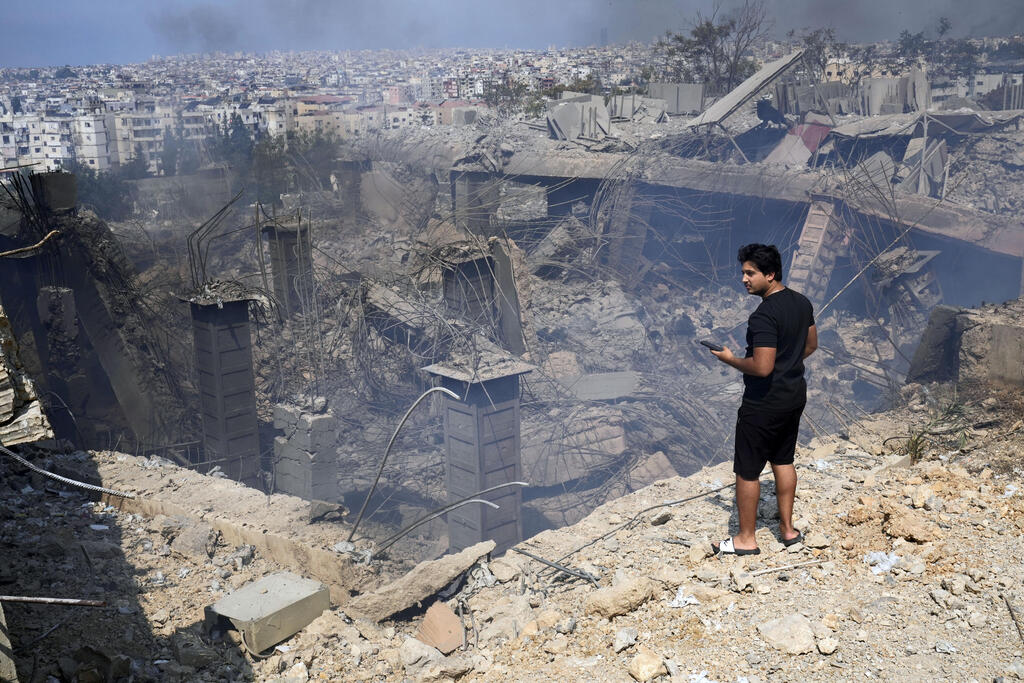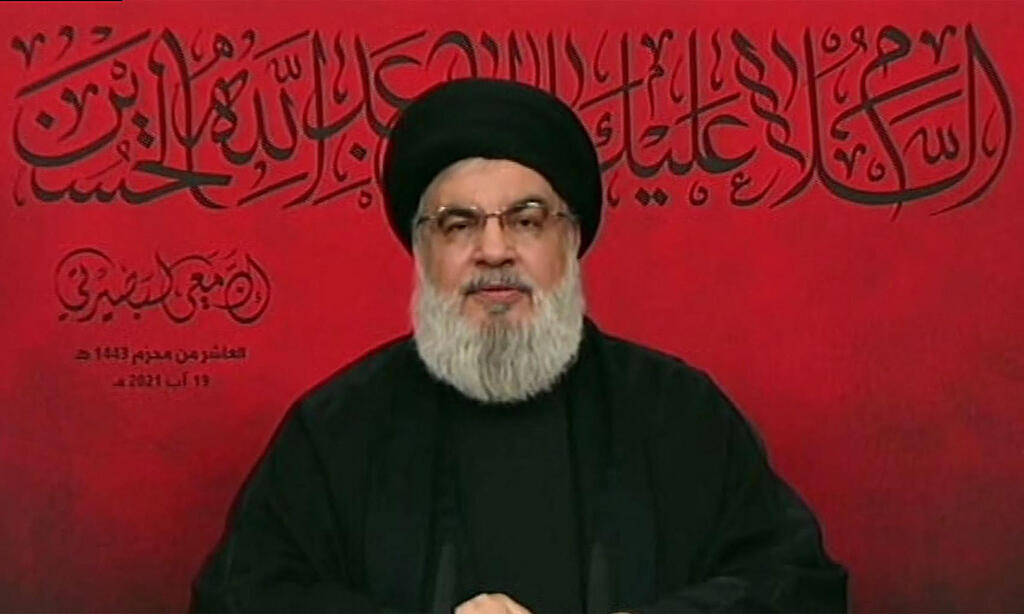Getting your Trinity Audio player ready...
The recently-slain Hassan Nasrallah was known for his speeches, which Israel closely monitored. These speeches, sometimes fiery, ended with his elimination, concluding years of lengthy broadcasts since the Second Lebanon War. These speeches were shown on giant screens to his supporters, who reacted as directed by their leader from his bunker.
Nasrallah addressing the issue of exploding pagers
In recent years, Nasrallah didn't speak live in front of crowds. His speeches were broadcast from his hiding place, yet he maintained control over his audience, and not just them. The Arab world, the Western world, and Israel watched every word, emphasis, and hint from Nasrallah, trying to understand the leader of the terror organization, Iran's ally, and his future plans.
Not all of his speeches focused on Israel. Some addressed Lebanon, regional issues, and religious topics. When he did address the issue of Israel, Nasrallah demonstrated extensive knowledge of internal Israeli issues, internal struggles, politics, the general atmosphere, and the Israeli media.
Nasrallah usually spoke in a very organized manner, outlining the agenda at the beginning of each speech. He often spoke slowly and calmly, with a half-smile—even when his organization was in distress—and ensured his ideas were repeated. Occasionally, he raised his voice to threaten, earning cheers from the crowd. The background behind him in the broadcasts changed from speech to speech, depending on the topic, circumstances, and date. What remained almost unchanged was Nasrallah's attire and appearance.
"Nasrallah taught us to take his speeches seriously, and we followed him blindly. It became a ritual. Nasrallah speaks, and everyone rushes to read, interpret, and explain," said Orna Mizrahi, former deputy head of the National Security Council and a senior researcher at the Institute for National Security Studies. "Nasrallah created a certain clarity for us. You could read the speeches, understand what he wanted, the directions, and the strategy. Now we need to learn anew where to find the signs of the organization's strategy if there is one at all."
Mizrahi said that in her view, the appearances of Nasrallah that will be remembered are mainly the "Spider Web" speech in May 2000, after the IDF's withdrawal from Lebanon, and the 2006 interview after the Second Lebanon War, where he said that if he had known what the abduction of Ehud Goldwasser and Eldad Regev would lead to, Hezbollah would not have carried it out.
Nasrallah, as Mizrahi described, didn't just deliver speeches—he also occasionally gave interviews to channels associated with his terror organization. In July 2022, marking 40 years of Hezbollah, he was interviewed by the Al-Mayadeen channel and spoke about the "end of Israel," envisioning a future where people would be seen with suitcases heading to airports, ports, and border crossings with Egypt and Jordan. Nasrallah claimed then that Israel is an "entity with no future" and asserted that it wouldn't take 40 years for this to happen.
Currently, it is worth noting that those who have fled and sought refuge are Nasrallah's own people, from the Shiite towns, from the southern Lebanon villages, from the Al-Bekaa area in southern Lebanon, and from the Dahiya district. Nasrallah used them over the years as human shields, hid weapons in their villages, and exposed them, without hesitation, to the threat of war.
As lies turn to embarrassment
Nevertheless, Mizrahi described that in his last speech, Nasrallah presented the complexity of assessing his enemy. "In his last speech, he continued with threats but acknowledged Israel's technological superiority. He had a positive appreciation of the enemy on one hand—and also a burning hatred and desire to do everything to make us disappear from his sight," she said. "He had a relatively restrained approach—understanding Hezbollah's limitations of power."
Nasrallah's speeches were indeed characterized by emotional displays. In a speech on Laylat al-Qadr this year, he mentioned the commandment of "Shahada" and the "martyrs" killed fighting Israel, spoke with a choked voice—and the audience cried together with him. In 2018, he broke into tears during a speech for Ashura ceremonies, condemning the custom among Shiite believers of cutting children's faces during mourning rituals. "The whole world sees what's happening here—and I ask you to exercise restraint and stay away from anyone trying to create a negative impression of us," he said then.
Nasrallah also tended to lie. "I don't know if he believed his lies or not," Mizrahi said. "It was very noticeable that in his early speeches, he talked about the many casualties in Israel and the deaths Israel is hiding. He talked about large numbers. Gradually, he talked less and less about these topics." According to Mizrahi, Nasrallah lied when embarrassed: "When it was hard for him to explain things, like October 7, he lied about things that happened that day."
Hezbollah's response to the elimination of Fuad Shukr, for example, led the terror organization to promote lies that Israel is hiding a significant attack at the Glilot base, with dead and wounded. The organization even provided "accurate" numbers—far from reality. "I don't know if someone whispered in his ear or if he tried to build a narrative," Mizrahi said. "In his speeches, he tried to build narratives. The narrative of 'Israel is weak,' for example, to build it, he also used internal tensions in Israel."
According to Prof. Eyal Zisser, an expert in the modern history of Lebanon and Syria and Deputy Rector at Tel Aviv University, Nasrallah's speeches were essentially the tool through which he outlined policy. "In recent decades, he wasn't publicly active, so his speeches were both for his supporters and his enemies, the only way to gauge moods, intentions, and plans," he said.
According to him, "Since he is the one who makes the decisions and he was central, the speech was something that summarized for us how he sees things, what he thinks, and what his plans are. It became the tool through which he and his organization say where we came from and where we are going."







